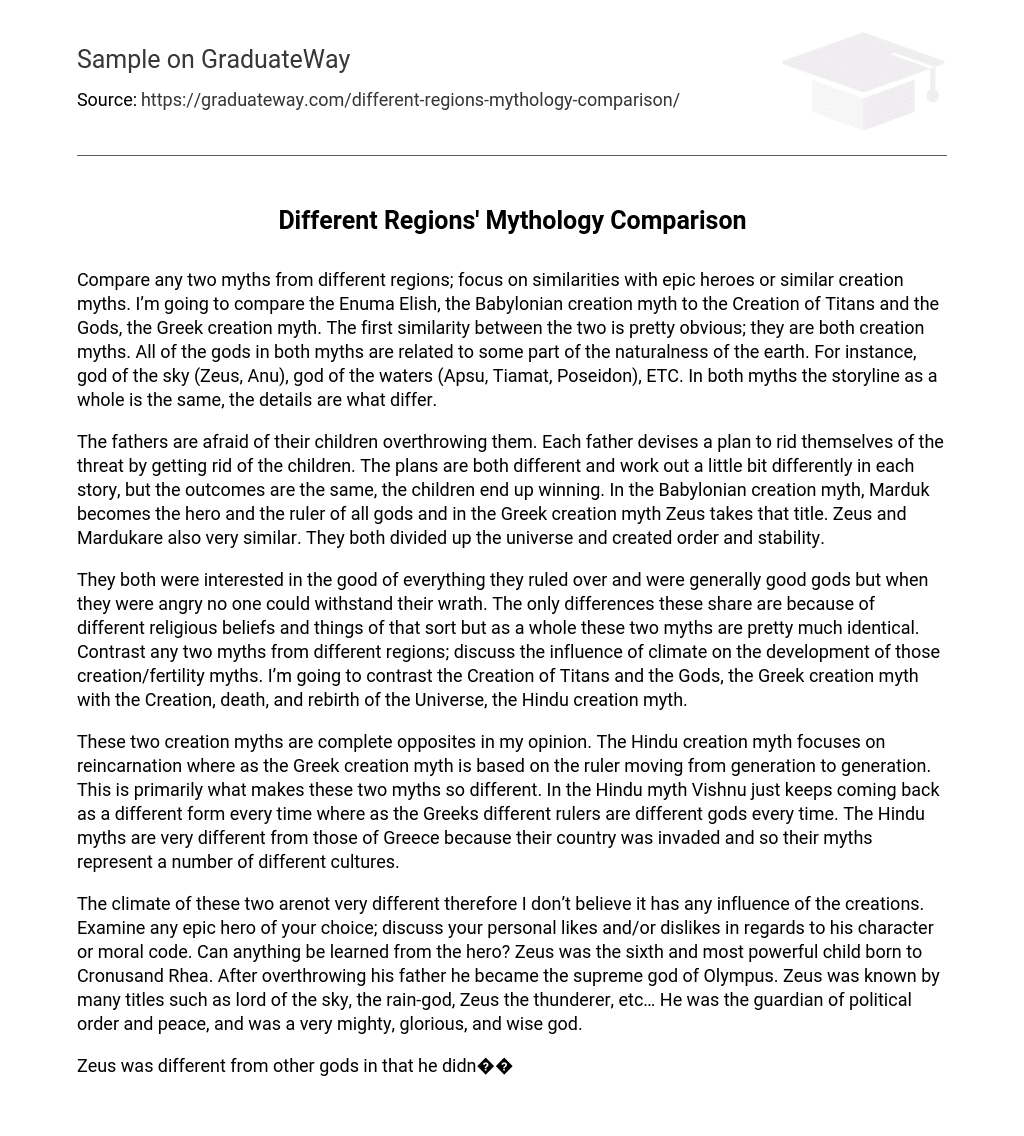Compare any two myths from different regions; focus on similarities with epic heroes or similar creation myths. I’m going to compare the Enuma Elish, the Babylonian creation myth to the Creation of Titans and the Gods, the Greek creation myth. The first similarity between the two is pretty obvious; they are both creation myths. All of the gods in both myths are related to some part of the naturalness of the earth. For instance, god of the sky (Zeus, Anu), god of the waters (Apsu, Tiamat, Poseidon), ETC. In both myths the storyline as a whole is the same, the details are what differ.
The fathers are afraid of their children overthrowing them. Each father devises a plan to rid themselves of the threat by getting rid of the children. The plans are both different and work out a little bit differently in each story, but the outcomes are the same, the children end up winning. In the Babylonian creation myth, Marduk becomes the hero and the ruler of all gods and in the Greek creation myth Zeus takes that title. Zeus and Mardukare also very similar. They both divided up the universe and created order and stability.
They both were interested in the good of everything they ruled over and were generally good gods but when they were angry no one could withstand their wrath. The only differences these share are because of different religious beliefs and things of that sort but as a whole these two myths are pretty much identical. Contrast any two myths from different regions; discuss the influence of climate on the development of those creation/fertility myths. I’m going to contrast the Creation of Titans and the Gods, the Greek creation myth with the Creation, death, and rebirth of the Universe, the Hindu creation myth.
These two creation myths are complete opposites in my opinion. The Hindu creation myth focuses on reincarnation where as the Greek creation myth is based on the ruler moving from generation to generation. This is primarily what makes these two myths so different. In the Hindu myth Vishnu just keeps coming back as a different form every time where as the Greeks different rulers are different gods every time. The Hindu myths are very different from those of Greece because their country was invaded and so their myths represent a number of different cultures.
The climate of these two arenot very different therefore I don’t believe it has any influence of the creations. Examine any epic hero of your choice; discuss your personal likes and/or dislikes in regards to his character or moral code. Can anything be learned from the hero? Zeus was the sixth and most powerful child born to Cronusand Rhea. After overthrowing his father he became the supreme god of Olympus. Zeus was known by many titles such as lord of the sky, the rain-god, Zeus the thunderer, etc… He was the guardian of political order and peace, and was a very mighty, glorious, and wise god.
Zeus was different from other gods in that he didn’t participate in the arguments and petty schemes that made up the daily activities of other gods. He did, however, demand just and righteous action from men, and if his demands weren’t meant he would be very vengeful. Although Zeus was pretty glorious in most things, the power or Eros – love, got him in a lot of trouble with his wife. He had many affairs & was never faithful at all to Hera, which did not please her one bit. Zeus is one of my personal favorites out of all the gods.
In my opinion, he has many more positive characteristics than he does negative. I think that he is for the most part very sensible and makes good decisions. He’s also a very good leader and protector. He takes care of business and does what has to be done, but he is always thinking about the well-being of his people, not just himself. He never did the selfish things that his father did and he did everything he could to correct the mistakes his father made for his mothers happiness. The one thing that I don’t really like about him is the affairs he had.
I believe he should have been faithful to his wife, but I wouldn’t say he was any less of a god for doing it. Other than the unfaithfulness, there isn’t anything else I could say that I dislike about him. I definitely think a lot can be learned from Zeus. He was very skilled in making good decisionsand keeping his people safe. Any good “ruler” could read about Zeus’ leadership and learn something from it! *Re-examine your examination ( Q*#3), does this model of behavior reveal anything about the culture from which it originates?
The Greeks were an earth based culture therefore; they placed different Gods in charge of different aspects of life, Zeus being the lord of the sky/rain god. The gods/heroes entered all parts of Greek society, domestic affairs, civic organization, gender, agriculture and war. The Greeks tried their best to always please the gods & live by their rulings in fear of upsetting them. These are just a few of the many things that show the impact of the gods, such as Zeus, on the culture of Greece.





